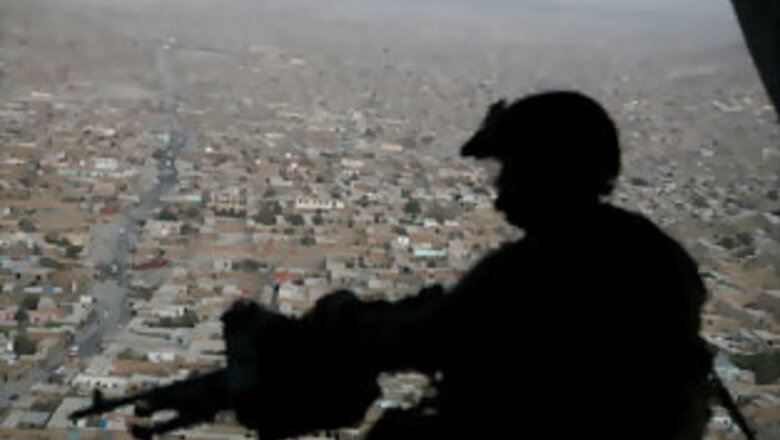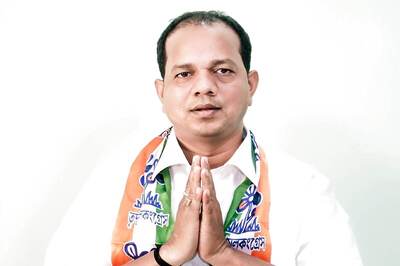
views
Washington: The United States built pressure on Afghan President Hamid Karzai on Wednesday, signaling that a troop increase could hinge on a successful run-off election and that the Obama administration would be receptive to a power-sharing deal between Karzai and his chief rival.
A coalition government or other political arrangement that included Karzai's rival, former Foreign Minister Abdullah Abdullah, could provide a critical internal check on Karzai, who is widely favoured to win the presidential run-off set for November 7.
President Barack Obama and Senator John Kerry, who pressed the administration's interests in weekend talks with Karzai in Kabul, both hinted on Wednesday that pending deliberations on possible US troop increases in Afghanistan could be affected by the Afghan leader's behavior.
Karzai's weak and corruption-riddled government has been blamed in part for the resurgence of the Taliban and for widespread Afghan civilian disillusionment. The Afghan national election in August was marred by massive fraud that led to the discarding of a third of the results, providing a wedge for the US to press Karzai to agree to the runoff with Abdullah.
Kerry, whose meetings with Karzai helped lead to the runoff agreement over the weekend, said on Wednesday after a White House session with Obama that the US president should wait until after new election to make his decision on troop strength.
Obama himself said on Wednesday in a television interview he might not announce his decision on sending more troops until after the runoff.
Both statements had the subtle force of increasing pressure on Karzai by implying that the administration's decision on US troop strength in Afghanistan might depend on how the runoff turns out.
The Massachusetts Democrat said on Wednesday that it wasn't "common sense" for Obama to determine whether more US troops should go to Afghanistan without knowing the election results. "You really want to know that this has worked, and you want to know what's coming out of it," Kerry said.
Officials said Obama's pending decision had prominently figured in the US discussions with Karzai about how to resolve the political impasse.
Several officials stressed that the looming troop plan decision was not used overtly to force Karzai to concede on the election's contested first round, but one highly placed US official in Afghanistan said the United States used Obama's deliberation over troop numbers as leverage.
PAGE_BREAK
That official spoke on condition of anonymity because Obama has not announced whether he will agree to a US military request for thousands of additional forces.
Karzai and Abdullah settled on the runoff following weeks of acrimony over Afghanistan's fraud-pocked national election. But both sides also are considering a coalition government that could either replace the runoff or follow it.
State Department spokesman Ian Kelly told reporters Wednesday that the US would not be opposed to a power-sharing deal, depending on its legitimacy and how it was implemented. Obama appeared to allude to the still-fluid discussions Wednesday.
"I think we're still in — finding out how this whole process in Afghanistan is going to unfold," Obama said in an interview on MSNBC.
While careful to say that any power-sharing deal would have to come from the Afghans and not the US, American officials were clear that Karzai's reluctant acceptance of a runoff vote may not be enough by itself.
Karzai and Abdullah have publicly dismissed the idea of sharing power, but there have been reports of private horse-trading discussions before and since Tuesday's announcement of the runoff.
Kerry told reporters after meeting with Obama on Wednesday that in Afghanistan he "did not discuss nor did I even attempt to put on the table the concept of a coalition."
It would be inappropriate to raise that possibility and would make it seem to Afghans that the United States was calling the shots, Kerry said. However, he acknowledged the issue was being discussed in Kabul, and said there may have been talks between the Karzai and Abdullah camps on it "even today."
In an interview on Wednesday with The Associated Press, Kerry said the discussions with Karzai grew intense at times.
"I turned up the dial a few times, believe me," Kerry said.
He added, "They were very emotional. And they were very passionate and very heated at times but nicely heated. You know there was never anger, there was always the intensity of the argument."
Another State Department official said Abdullah's camp had expressed interest in a coalition or power-sharing deal, and that some Karzai aides, concerned about the results of a runoff, are willing to consider the idea despite the president's public repudiation of the idea.
That official said the US would support any course that leads to the formation of a credible government in the eyes of the Afghan people. The official spoke on condition of anonymity because the negotiations don't involve the US
That could include a coalition or other power-sharing arrangement that is either formed to eliminate the need for a second round or one that is created using the results of the runoff.
But there are no provisions for a coalition in the Afghan Constitution, and it is not clear how such a deal would work or remain enforceable.
The most important near-term goal for the US was Karzai's acceptance of election commission results and his recognition that the impasse must be resolved.




















Comments
0 comment